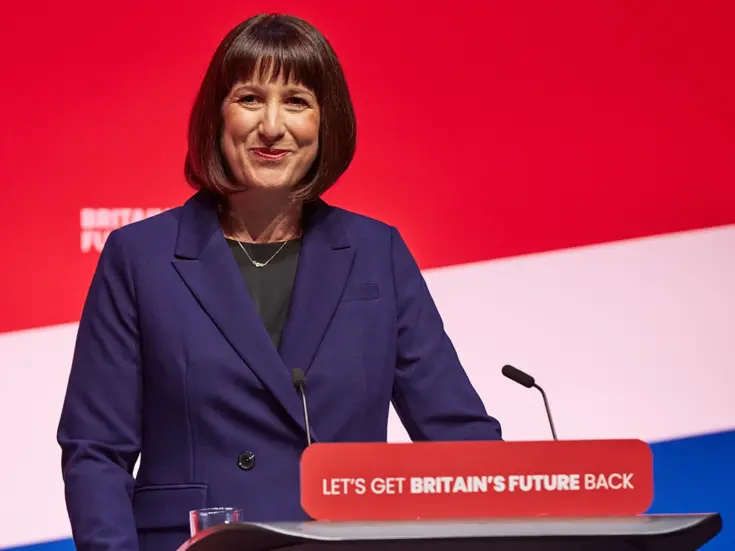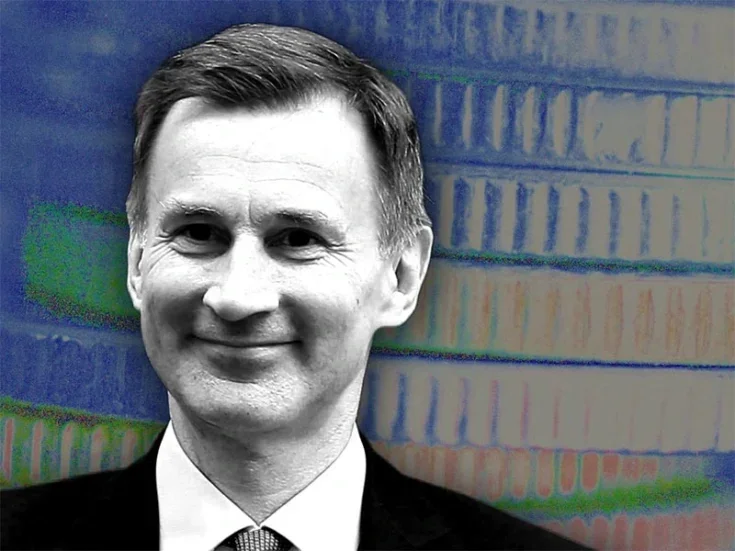
William Cash believes the rich should be undisturbed, something he says Gordon Brown understood

The week before the Sunday Times Rich List published their annual survey of UK wealth, I participated in two very different wealth-inequality themed debates in London. The wording of the motions told you everything you needed to know about political attitudes towards the UK’s top wealth creators (those on this year’s Rich List have ‘doubled their wealth since the 2009 economic crisis’).
The first debate, organized at Conway Hall on Red Lion Square by the New Statesman, was entitled: ‘How do you solve a problem like the rich?’. Speakers included Owen Jones, the left-wing intelligentsia’s answer to Russell Brand; he also appeared as the left wing’s star striker the following night at the Spectator debate in a Barbican concert hall entitled ‘Politicians should leave the wealthy alone’.
That our most successful wealth creators, entrepreneurs and philanthropists and our most heavily taxed high-achievers – including surgeons, civil servants, lawyers, industrialists and business leaders – can be described as a ‘problem’ reveals much of how the wealth debate has been turned into a divisive form of populist politics: us v them; bankers v ordinary people; the haves v the have-nots.
Or as the election guru Vernon Bogdanor – Cameron’s old politics tutor at Oxford – has stated, the great divide in the last two decades is between those who have benefited from rising property prices and globalisation, and those who have been left behind. But left behind by whom?
Economic inequality in modern Britain should not be a problem for society. The rich already help to pay their way to create a more fair society. Simply blaming the rich for rising levels of social inequality is to forget that to redistribute wealth, you first have to create it.
Having relative inequality, with the richest bearing the greatest tax burden to pay for our hospitals and schools (that the richest don’t tend to even use), is the price we pay for economic prosperity in a fair and just society.
The rich-bashing that we have heard from Ed Miliband is a form of Robin Hood economics whose very taxes – like the mansion tax – are likely to bring in less than the current system contributes to the Treasury. As we shall see, no party contributed more to the wealth divide than New Labour.
Content from our partners
In regards to the specifics of the mansion tax, Labour’s Ed Balls says it will bring in £1.2 billion a year. But this is just populist chicken feed. Notwithstanding the estimated £175 million that HMRC have estimated the taxpayer will have to fund for disputed valuations as to whether a house is within the £2 million price bracket, the Office for Budget Responsibility say it will cost over £2 billion a year in lost stamp duty and inheritance tax revenue. If you take £1.2 billion from £2 billion, that doesn’t leave much left for new hospitals and schools.
The negative impact of the newly hiked stamp duty on £2 million-plus houses is already showing in the Treasury’s books. Last week I met with Mayfair’s top estate agent, Peter Wetherell, who told me that the official figure for the number of transactions in Mayfair in the first quarter of this year amounted to just thirteen – down from 40 two years ago. That is more millions lost to the Treasury that could have been spent on schools and hospitals.
It is largely a myth that Labour’s wealth and stealth on the rich taxes actually help the less well-off. They often achieve the opposite and – especially in the run-up to an election – are often motivated more by populist class war rhetoric rather than measured logic.
As Fraser Nelson, editor of the Spectator, said in his opening remarks at the second of last week’s debates: ‘My side of the debate is out to defend the seemingly indefensible, the most derided group of people in Britain. We want to persuade you that the richest are not a problem to be sorted, a disease to be cured. You may resent them – but we need them here. We need their money… Inequality is a problem in Britain, don’t get me wrong. But there is a choice between what Tony Blair called the “politics of anger” and the “politics of answers”.’
The rich are not the real problem; and I do not blame the mobile army of international super-rich who have descended on Mayfair’s or Chelsea’s garden squares for coming here to take advantage of the tax system that successive British governments – most notably under Tony Blair when Gordon Brown was chancellor – created. The Blair regime that was so friendly to the super-rich that Peter Mandelson famously said New Labour was supremely relaxed about people getting ‘filthy rich’.
Let’s begin with the non-dom debate. Why are so many super rich here? Why is London property now regarded as its own asset class? What is often forgotten in the wealth inequality debate is that that the chief architects of the holy, or unholy, alliance between the international rich and London were the Labour government that existed when London seized the financial crown away from New York as the new global capital of the world.
Not only did 9/11 seriously dent New York’s financial and social confidence but, more importantly, the Sarbanes-Oxley regulations that were introduced in 2002 after the Enron scandal over-regulated New York’s financial services sector, effectively passing the crown onto London.
When the crown unexpectedly came to London, it didn’t take long for Blair to work out that the only way that the Labour government could afford to tax and spend was if the UK economy was heavily subsidised – with the economy put on life support – by the wealth-creating class, most specifically the new breed of super-rich – or the tax-conscious rich as we preferred to call them in Spear’s 2006.
The truth is that the Labour government needed the rich to prevent the country going bust. Brown may have been ‘prudent’ on the domestic tax front, raising roughly the same level of tax as the Tories had in the previous decade. But he was also very deliberately also propping up and supporting London as a global tax haven to such an extent that by the end of his term as chancellor the UK had become the ‘most populous tax haven in the world’ according to an IMF study.
According to international tax and off-shore expert Richard Murphy, Brown’s chief economic legacy was to make the UK the ‘billionaire’s first choice of residence’.
That’s Gordon Brown I’m talking about. Not his Tory-sleaze predecessors. Before Labour came to power in 1997, Blair hired Stephen Fry and Hugh Laurie to ridicule tax abuse by the super-rich, along with multinational corporates. Tax avoidance was such an emotive issue for Brown himself that in 1993 he demanded that ‘the chancellor should end the tax abuses which reach to the heart of our public finances by indulging the super rich at the expense of all the rest of us’.
Why the change of heart? Why the political U-turn? The snag was that by the time Brown was actually in charge of the nation’s finances he soon realised that sending the non-doms home and introducing new wealth taxes would be economic suicide. He relied on the mouth-watering VAT receipts, stamp duty, corporation taxes and other income streams that flowed into the Treasury as a result of these very high-spending non-doms and international rich that had made London their new global HQ.
So it was Brown and Blair – not the Tories – that made Britain the tax haven of choice for the world’s mega-rich. This was also the conclusion that Robert Peston came to in ‘Who Runs Britain?’. In it, Peston describes how ‘Gordon Brown’s actions had created London as a mecca for the super-rich, saying that ‘he very carefully shied away from ever alienating them’.
One reason that the economy is so co-dependent on the financial services sector – in which so many non-doms work – is that the UK itself has an economic problem in that the UK’s economic growth has largely been in reinventing itself as a service economy at the expense of its manufacturing sector. This means that foreign banks, law firms and private equity firms need to be lured to London via ‘tax competition’ and a relatively benign tax regime that resulted in the number of non-doms coming to the UK actually doubling under New Labour.
Our trade deficit has had to be plugged by financial services, which are one of the few sectors in which we have a trade surplus. So killing the golden goose didn’t make any sense for the last Labour government which is why they chose, for the most part, to leave London’s wealthy alone.
Very little has changed today. It is not so much that the rich – or super-rich – are a problem; it is more that they are a necessity. This becomes clear enough when you read a February 2015 House of Commons briefing note entitled Financial Services: Contribution to the UK Economy.
In 2014, financial services contributed £126.9 billion in GVA (gross value added) to the economy with nearly 4 per cent of all jobs. The only OECD countries in the world that are more reliant on their financial services as much needed economic life-support are Luxembourg, Australia and the Netherlands.
Government research by PWC found that the banking sector alone contributed another £65 billion last year in total government tax receipts. That includes income tax, national insurance, corporation tax, the bank payroll tax and the banking levy – but doesn’t include the extra billions in VAT paid on dinners at Hertford Street, private jets or stamp duty on London houses.
The other myth often peddled by the left – and most loudly by its high priest Thomas Piketty – is that as the richer get richer, the poor get poorer as a result of the great wealth divide.
Alas, this just isn’t true. Piketty’s sums and research simply do not fit the narrative he wants us believe is true, namely that the rich always get richer. This is an economic fiction. In a cautionary attempt to warn their ultra-high net worth clients about the importance of proper financial planning, JP Morgan have gone to the trouble of trawling through the original pre-war Forbes Rich List of the richest 30 families and found that only one family from the original list was on the new list when it was revived as the Forbes 400 in 1987.
As a report by Bank of New York Mellon into Forbes lists has shown, most rich families actually lose most of their wealth by the end of the third generation – hence the phrase ‘shirtsleeves to shirtsleeves in three generations’.
The Mellon report describes this failure of the super-rich to hold onto their wealth: one-third of families make it to Generation 2; 10-12 per cent to Generation 3; and only 4 per cent to Generation 4. A remarkable 90 per cent of rich families have lost almost all their wealth by end of third generation. At the Vanderbilt family meeting in 1973, there were 120 family members and not a single millionaire among them.
The real reason super-rich families’ fortunes fail is nothing to do with Pikettian economic theory about the wealth divide but everything to do with litigating, bickering, divorce, and death.
While we compiled our Spear’s 500 guide to the top players in the private client wealth management world, one of the most interesting trends was the number of former industrial, retail and manufacturing British families, whose core business today – third or fourth generation – is providing advice to a new generation of entrepreneurs themselves as asset managers or financial advisers.
Again, far from endorsing the Piketty mantra that the richest families only get richer, our survey of Britain’s wealth management sector found the reverse to be true. This year’s Sunday Times Rich List has the Queen dropping out of the to 300 richest in Britain for the first time since the list began. In many ways, our old ruling and aristocratic families are now the financial servants and waiters of the world – albeit living off good tips. Most of them certainly can’t afford to live in the fancy London neighbourhoods where they were brought up.
Just like with Miliband and his Robin Hood economics, Piketty’s sums and socialist narrative (he wants a 80 per cent global wealth tax) which forecasts an ever-widening wealth divide in this country between the ‘rentier’ class and the rest just doesn’t add up.
The truth, as economist James Bartholomew has noted in his new book ‘The Welfare of Nations’ (Biteback), is that the poorer in society have actually been getting richer since Denis Healey (legendarily) said he wanted to ‘tax the rich until the pips squeak’. ‘The British poor have got much richer so it would be unreasonable to say there is a growing problem here,’ Bartholomew says.
We now live in a new world order in which not only do we have a War on Terror but we also now have a War on the Rich – most specially the super-rich. But soaking the rich, or demonising wealth creation, makes no sense. We should be thanking and encouraging our business owners and wealth creators rather than suggesting ‘wealth creation’ is somehow a bad thing.
It is a good thing not least as the 2015 Sunday Times Giving List has shown that more than 300 philanthropists gave a combined £2.58 billion to charity. That’s £180 million more than the £2.4 billion that came from about 280 philanthropists in 2014. That’s more than the estimated revenue from the Mansion Tax alone.
The list reveals that 105 people gave more than 1 per cent of their total worth in the past year. Four of these gave more than 25 per cent of their wealth. Far from demonising wealth creators like David Ross, it is worth remembering that it is such philanthropists who have funded so many opportunities for less advantaged children – especially in the North. They continue the spirit of wealth redistribution practiced by the likes of Andrew Carnegie through to Sir Elton John.
The David Ross Education Trust has spent millions developing a network of ‘diverse schools and academies’ which aims to ensure that ‘everyone has access to a high quality academic education’. The trust is a good example of how a wealth creator is helping to redistribute the wealth cake in a way that – rightly in my view – does not subscribe to the view that ‘one size fits all inn education’.
The Ross schools are about responding to the needs of local children and local communities – not state-set targets and one size educational philosophies. Ross believes that ‘parents should have choice and diversity and be able to choose from a range of schools within their area to best meet the needs of their child’. This is the very opposite of what Tristram Hunt wants under a Labour government where the state ‘knows best’. Surely giving parents a choice over their children’s education is a good thing for society?
It is also not true that the right want to make it harder for the less well-off to pay their weekly bill and rents. Where there is a truly worrying wealth divide today that is opening up is between the working-class poor and the middle classes. That is a problem area that needs attention – not the rich or super-rich.
I’ve recently spent time inside the huge distribution factories of the like of Ocado, Aldi and DHL on the fringes of Birmingham, where an average monthly pay packet (for a 45-hour week) is just over £900 after tax. Nobody can be expected to live off that – but that is the reality of a ‘working wage’ in parts of the UK today.
Labour have blamed this wealth divide on zero-hours contracts, with the issue of ‘exploitative labour’ being put centre stage by Ed Miliband, who has said he wants to ban them. But is also worth pointing out that zero-hours contracts and ‘exclusivity’ clauses first started to be used exploitatively – and became commonplace – under the Brown government as companies tried to cut costs after the financial crisis.
They were given legitimacy under Labour again through the National Minimum Wage Act 1998, which gave workers on zero-hours contract the right to be paid for ‘stand-by time’ and ‘on-call time’. While this was intended to safeguard workers’ rights, it often ended up creating a situation where workers are required to ‘obtain permission’ before accepting other work.
The best way to fight social inequality is not via wealth taxes but rather to create the best educational and social conditions so that everybody has a fighting chance of success and social mobility. Wealth taxes peddled by Miliband also hang up a sign outside Downing Street saying that Britain is ‘closed’ for international business.
My deepest issue with the Left’s War on the Rich is that they seem hopelessly unaware of the revolutionary strides that have taken place in recent years to close down the tax loopholes that have allowed offshore tax-avoidance in secret Swiss and Lichtenstein bank accounts and tax havens. The cliché fairyland world of tax havens that seem to belong in a John le Carré novel, as conjured up by Miliband, simply no longer exists. Former OECD blacklisted countries like Switzerland, Monaco and the Cayman Islands are now heavily regulated.
The recent scandal about the 30,000 secret Swiss HSBC accounts was ‘old news’ – the accounts were stolen by Hervé Falciani from inside HSBC Suisse back in 2006. That’s nearly a decade ago, yet the HSBC case still generates headlines. By the time the head of tax at HMRC met with HSBC (in April 2010), the ‘wealth and tax landscape’ of Europe had already been closed down.
If the Left were so keen on squeezing the rich, why didn’t they close down all the offshore bank accounts and tax loopholes when they were in power from 1997-2010, when the excesses of UK offshore tax avoidance were at their very worst under Blair and Brown?
The reason is that a government cannot ‘spend’ its way to wealth equality as it simply doesn’t work. There will always be wealth inequality so it is both reasonable and desirable for the wealthiest to pay the most tax – which they do – in order to support the less advantaged parts of society.
The other problem with the wealth divide debate is that so many of the real problems with social inequality are not solved by money alone. Many true entrepreneurs I know work almost for free. They are driven not by the desire for exploitation but out of a sense of vocation. They are not even driven by money, let alone greed. To define ‘wealth’ in only material or financial terms is a very outdated social idea. But then Miliband was brought up in a Marxist household.
The best we can do is tax the rich fairly – and then leave them alone. Which is exactly what Gordon Brown himself recommended when he was asked in the House of Commons as Chancellor in 2009 about what to do about the number of non-doms coming to the UK:’I have to say that the proposal that we can find 150,000 non-domiciles to tax is completely wrong: only 115,000 are registered in this country, and only 15,000 have earnings and income that would allow them to consider that paying £25,000 in taxation was in their interests; others are nurses and teachers who earn little more than £25,000. Those who put forward proposals to tax non-domiciles, and say that they can raise £3.5 billion, will have to do better in future.’
The same applies to School of Piketty economics some six years later. Looking at the most recent figures, the Economist concurs with the former prime minister arguing that Miliband’s war on the non-doms makes no sense, as of 110,000 who claimed non-dom status last year, 64,000 chose to be taxed on their overseas earnings because their liabilities would be less than the min charge £30,000 to claim the tax-exempt status. The Treasury ‘would also lose £150 million-£450 million’ from those who would lose their special tax status.
So the rich-bashing rhetoric doesn’t add up. The rich will always be with us not because wealth inequality is just but because we need them.








